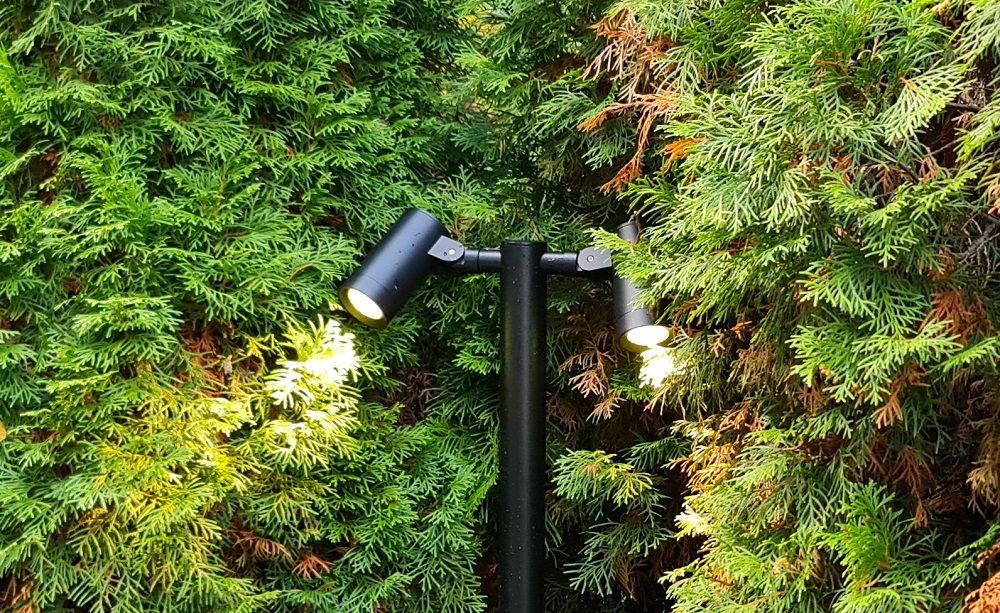Summarize
- The IP class determines the luminaire's protection against dust and water
- For humid areas, a minimum IP44 rating is recommended
- IP54 and IP55 are suitable for outdoor use, but not for recessed luminaires
- IP65 rating is the best choice for very humid outdoor environments
- IP67 and IP68 can withstand harsh environments such as industrial environments
Choosing lighting for wet rooms can be a challenge, as the lighting needs to be stylish, safe and durable.
One of the most important considerations when choosing luminaires is their IP rating, which indicates their ability to protect against moisture and dust.
In this article we will discuss the different IP classes and their importance in the selection of luminaires for use in damp locations.
You will learn what IP ratings mean and how to choose the right rating for different applications, as well as information on the protection of luminaires against water and dust.
This allows you to make an informed decision about the right choice of lighting and enjoy safe and functional lighting in damp areas of your home.
What is the IP class and why is it important in a wet room light?
The IP (Ingress Protection) class is a standard that defines the level of protection of a luminaire against different environmental conditions. In addition, the standard uses two numbers, the first indicating protection against dust and the second against moisture. The higher the number, the better protection the lamp has. For example, an IP44 rated luminaire is well protected against moisture and debris, but cannot withstand immersion in water.
The IP class is very important for a luminaire in a damp location, as moisture and electricity can be a dangerous combination. Therefore, the protection level of the luminaire must be high enough to ensure safe and reliable use in humid conditions.
IP21 – How is it suitable for humid environments?
The IP21 rating provides limited protection against debris and water droplets. It is more suitable for dry or slightly damp areas, such as porches or garages. This rating is not adequate for shower rooms or outdoor use, as it does not provide sufficient protection against water.
IP44, IP54, IP55, IP65, IP67 and IP68 – What is the difference?
The IP class is therefore the dust and water resistance rating of the helmet.
The IP44 rating protects against splashing water and debris and is ideal for use in damp areas such as a washroom or kitchen.
The IP54 rating provides limited protection against water droplets and is designed to withstand humid conditions such as outdoors or in a basement.
The IP55 rating protects against strong splashing water and is a very good choice for damp areas such as bathrooms or outdoors.
The IP65 rating protects against strong splashing water and dust and is the best choice for outdoor lights such as outdoor lights or garden lights.
The IP67 rating provides very good protection against water and dust and is suitable for very humid and dusty environments such as industrial environments.
The IP68 rating is the highest possible protection rating and means complete protection against water and dust. It is suitable for very demanding conditions, such as recessed light in pools or other bodies of water.
See the table below for the official IEC specification
| First issue (PÖLY) | Second number (WATER) | ||
| 0 | No protection. | 0 | No protection against water. |
| 1 | Protection against large pieces, diameter 50 mm or more. | 1 | Protection against vertically dripping water. |
| 2 | Protection against medium-sized pieces, diameter 12,5 mm or larger. | 2 | Protection against water falling vertically or at an angle of up to 15°. |
| 3 | Protection against small pieces, diameter 2,5 mm or more. | 3 | Protection against water falling at an angle of up to 60°. |
| 4 | Protection against very small particles, 1 mm or more in diameter. | 4 | Protection against splashing water. |
| 5 | Protected against dust. Does not require a perfect seal, but harmful dust deposits must be avoided. | 5 | Protection against water jets from all directions. |
| 6 | Complete protection. Dust-proof. | 6 | Protection from powerful water jets from all directions. |
| 7 | Withstands momentary immersion in water | ||
| 8 | Resistant to continuous immersion in water. The maximum permissible installation depth may be indicated as an additional marking. Usually, the device is completely leakproof, but not necessarily, water can get inside the device without causing any harmful effects. |
IP21 rating of the light – What you should know before buying?
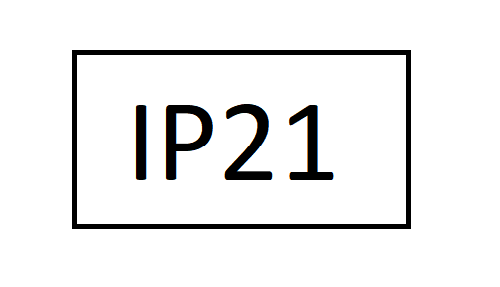
The IP21 rated luminaire offers limited protection against debris and water droplets. It is more suitable for dry or slightly damp areas, such as porches or garages. This IP class is not adequate for shower rooms or outdoor use where the luminaire will come into contact with water.
How does the IP21 rating affect the use of the luminaire in humid environments?
The IP21 rating does not provide sufficient protection against moisture, so its use in humid areas is not recommended. If the light is used in a damp environment, its lifetime may be reduced as water may enter the light and cause damage to the light.
The most popular applications for IP21-rated luminaires
IP21 rated lights are better suited for dry or slightly humid areas. They can be used to illuminate a wardrobe or other dry interior spaces where humidity is not a major factor. They are also ideal for a garage, warehouse or covered porch, as they are not at the mercy of splashing water.
IP44 – Reliable choice for damp environments
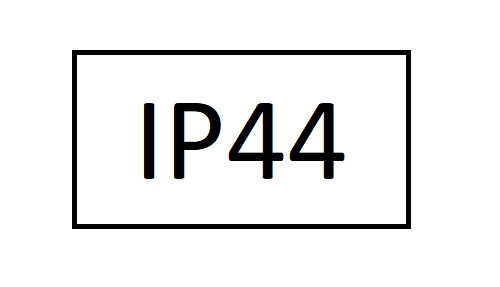
Why IP44 is a good choice for humid environments?
The IP44 rating provides protection against splash water and debris. It is well suited for damp areas such as the washroom or kitchen. IP44-rated lights are relatively inexpensive and provide adequate protection against moisture, making them a common choice for many damp areas in the home.
Advantages and disadvantages of IP44 rated luminaires
IP44-rated lights are a common and affordable choice for damp locations. They provide adequate protection against moisture and debris, but are not waterproof. Nor do they offer protection from dust or other particles. This IP rating is well suited to damp areas of the home, such as the washroom, but may not be suitable for the most demanding conditions.
Popular IP44-rated light models
There is a wide range of IP44-rated luminaires on the market for different purposes. The most popular models are ceiling lights, wall lights and bathroom mirror lights.
IP54 rating – Weatherproof choice for outdoor use
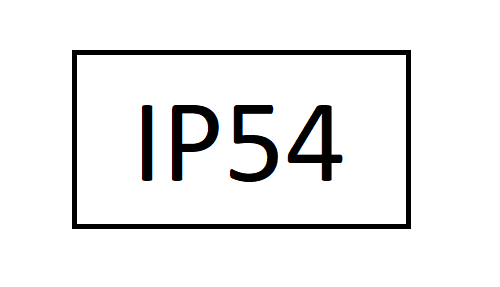
What makes an IP54-rated light suitable for outdoor use?
The IP54 rating provides good protection against rain and debris. It is well suited for outdoor use, such as on a terrace or in the garden. However, this classification does not provide adequate protection for submersible lights or other lights that come into contact with water.
IP54 rating and its importance for luminaire protection
The IP54 rated light provides good protection against rain and debris, but is not fully waterproof.
This rating is well suited for outdoor use, but is not sufficient to protect recessed lights or other lights that come into contact with water. So IP54 just offers more dust protection than IP44.
The best IP54-rated lights for outdoor use
There are many different IP54 rated luminaires for outdoor use on the market. The most popular models include wall lights, LED panels and ceiling lights. IP54 is the most popular IP class for LED panel lights.
IP55 rating – Reliable choice for damp environments
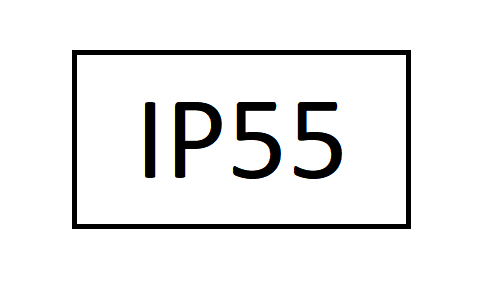
How does the IP55 rating protect the light from moisture?
The IP55-rated luminaire offers good protection against splash water and dust. It is well suited for damp areas such as bathrooms or laundry rooms. However, this classification is not adequate for shower areas or recessed lights in contact with water.
Advantages of IP55-rated luminaires compared to other ratings
The IP55 rating is a good choice for damp locations, providing good protection against splash water and dust. It is ideal for use in the bathroom or laundry room where water splashes and moisture can be common. However, this classification is not adequate for shower areas or recessed lights in contact with water.
Best IP55-rated light models
There is a wide range of IP55-rated luminaires on the market for different purposes. The most popular models are column luminaires and wall lights.
IP65 rated – Best choice for outdoor use
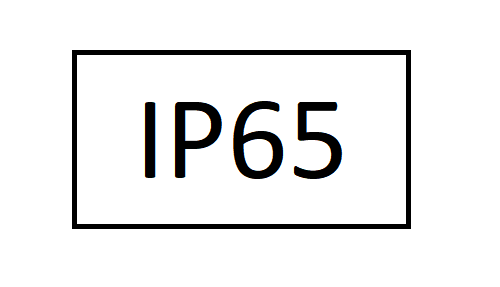
Why is the IP65 rating recommended for outdoor use?
The IP65 rating is the recommended choice for outdoor use, as it offers very good protection against water and dust. This rating is well suited for use on patios, yards or other outdoor areas where light are exposed to the elements. The IP65 rating is also a good choice for recessed lights that come into contact with occasional water.
How does the IP65 rating prevent water and dust from entering the luminaire?
The IP65-rated light offers very good protection against water and dust.
The lights seals prevent water and dust from entering light, making it ideal for outdoor use. This classification is also well suited for submersible lights that come into contact with water.
Most popular IP65-rated light models for outdoor use
There are many different types of IP65-rated outdoor luminaires on the market, with the most popular models being floodlights and ground luminaires. Led strip for outdoor use is the most popular IP class out there.
IP67 rated – Excellent choice for demanding environments
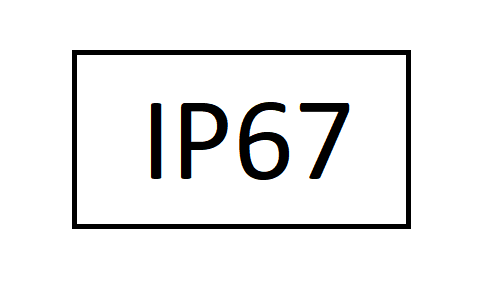
How does the IP67 rating differ from other ratings?
The IP67 rating is one of the highest ratings, providing excellent protection against water and dust. This classification is highly suitable for use in demanding environments such as marine, industrial or construction sites. IP67 rated lights are also a good choice for outdoor use where weather conditions can be very challenging.
Why is an IP67-rated luminaire suitable for very humid and dusty conditions?
The IP67-rated luminaire offers excellent protection against water and dust, making it a suitable choice for very humid and dusty environments. The light is fully sealed, so it is highly resistant to, for example, heavy rain or constant dust. This rating is ideal for use in industrial applications where very high protection is required.
Best IP67-rated light models
IP67-rated luminaires include task luminaires, ceiling luminaires and wall luminaires.
IP68 rating – Top class water resistance for demanding environments
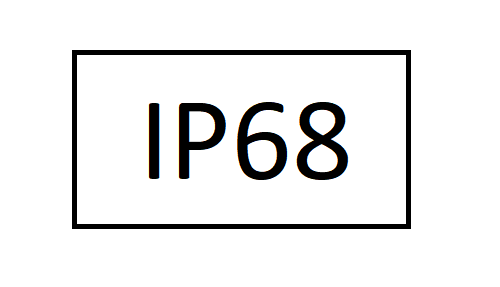
What does the IP68 rating mean?
The IP68 rating is the highest rating available, providing excellent protection against water and dust. This rating is highly suitable for use in demanding environments, such as marine or swimming pools, where lights are required to have a high level of water resistance.
Why IP68 is the best IP class.
The IP68-rated luminaire is fully sealed, providing excellent protection against water and dust. The light is highly resistant to very humid and challenging weather conditions. This classification is ideal for use in swimming pools and submerged in the ground, for example.
The best IP68-rated light models for challenging conditions
IP68-rated luminaires are available for a wide range of applications. The most popular models are, for example, recessed luminaires, outdoor lights.
Summary
The IP rating is an important factor when choosing lights for damp or challenging environments.
The rating indicates the light protection against water and dust, and can be used to select the right light for the application. The IP21 rating is suitable for lighter humid conditions, while the IP44 rating offers better protection against moisture and is ideal for bathrooms, for example. IP54 and IP55 rated lights are ideal for outdoor use, while IP65 is the best choice for very humid conditions. The IP67 and IP68 rated lights can withstand very challenging weather conditions and are suitable for applications such as ships, construction sites or pool areas.
In addition to the IP rating of the luminaire, it is important to choose the right luminaire for the application. When choosing lights, you should also pay attention to factors such as light output, energy efficiency and style. The right choice of light ensures safe and functional lighting in wet and challenging conditions.
We hope that this guide helped you to better understand the importance of IP rating when choosing lights.
Remember to choose the right light for your application and always follow the manufacturer’s instructions for installation and use.
LED lighting expert
LedStore has been an expert in led lighting since 2010. We have our own product design, so our products are technologically state-of-the-art.
We focus on light colour temperature controlled and high colour rendering index lights. We do around 500 lighting designs in a year.
We offer a service of custom made led strips, i.e. custom made led light strips in profile. Also installed.
Remember that we are always ready to offer our help to you along the way, by email (myynti@ledstore.fi) and by phone (045 251 4510).
As always, feel free to share photos of your own projects on social media at ledstore.fi at Instagram and ledstore.fi at Meta. We love to see the cool things done by our LEDs, and it also helps to provide inspiration for those who are not sure about the power and awesomeness of LEDs. Did you know that we already have over 3 500 pictures of our LED installations in our Gallery!
Led Lights Gallery:
Product gallery: Pictures of products in different installation locations
Indirect light: Indirect light in different spaces
Room-specific: Light in different rooms
References: Complete houses that have been photographed
FAQ
1. What does IP rating mean in luminaires?
The IP (Ingress Protection) class describes the luminaire’s protection against dust and moisture. The first number indicates protection against solid objects (scale 0-6) and the second number indicates protection against moisture (scale 0-8).
2. Which IP rating is suitable for bathroom lighting?
For bathroom lighting, a minimum IP44 rating is recommended to protect against splash water. For areas near showers or in damp areas exposed to direct water, IP65 rated luminaires should be chosen.
3. How does the IP rating affect the choice of outdoor luminaires?
For outdoor use, the minimum requirement is usually an IP44 rating, which protects against splashing water. For open outdoor areas exposed to rain or dust, IP65 rated luminaires are recommended for best durability.
4. What does the IP68 rating mean?
The IP68 rating means that the luminaire is fully dustproof and resistant to continuous immersion in water. Such luminaires are suitable for special situations such as swimming pools or other underwater environments.
5. Can the indoor luminaire be used outdoors if it is IP44 rated?
The IP44-rated luminaire can be used in covered outdoor areas such as terraces or balconies. However, in open and completely unprotected outdoor areas, it is recommended to use at least IP65 rated luminaires for best protection.

